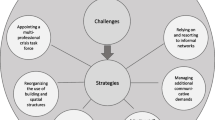Abstract
Authors deal with practice of nursing care provided to Muslim clients in the Czech Republic. They use the explorative research design. By means of analyses of 21 semi-structured interviews with important social actors in the area of health care (spa resorts and hospitals). The study shows that Muslims are not homogeneous in their behaviour in the field of health care. In the spa environment, three interpretation perspectives can be found: the economic interpretation of a Muslim as the source of income of the Czech spa industry, which faces economic problems, the cultural interpretation developed within the spas (the experience capital of the staff and other clients), and the (a) cultural interpretation of Muslims and Islam brought to spas from the outside (the public opinion). However, in the area of hospitals, Muslims are not separated from the remaining categories of students; Muslim patients represent a small group of persons, and their treatment being conditioned by the distance or closeness of cultures, language skills, adaptation, and experiences with treatment in the Czech environment as perceived by the staff.
Similar content being viewed by others
Notes
The text was supported by the “Islam in the Czech Republic: The Establishment of Muslims in the Public Space” project, which is implemented within the Program of Security Research in the Czech Republic for the years 2010–2015 (VG20132015113).
For example, the situation in the Czech spa town of Teplice, when people repeatedly complained about the noise and behaviour of Muslims staying in the local Šanovský park. In protest, these critics organised an event of collective walking of dogs in that park. As the date of the event, they chose the day when Muslims celebrated the end of Ramadan in the park (Dvořák 2015).
Visas for stays lasting for max. 90 days, referred to as “short-term visas”, are visas valid for one or several entries and entitle their holders to stay on the territory of the Schengen Area for the time specified in the visas, where the duration of an uninterrupted stay and the total duration of successive stays on the territory of the Schengen Area must not exceed 90 days during each 180 days. Such visas are granted by the Ministry of Foreign Affairs of the Czech Republic and an application for the extension of the duration of a stay on the territory under a short-term visa is filed to the Immigration Police departments.
References
Al-Yousefi, N. (2012). Observations of Muslim physicians regarding the influence of religion on health and their clinical approach. Journal of Religion and Health, 51(2), 269–280.
Berger, P. (1990). The sacred canopy: Elements of a sociological theory of religion. New York: Anchor books.
Berger, P. L., & Luckmann, T. (1999). Social construction of reality. Brno: Centrum pro studium demokracie a kultury.
Černín, F. (2010). Religion as the Perception of reality in public space. In D. Ryšavý (Ed.), Sociologica-Andragogica 2010 (pp. 91–99). Olomouc: Univerzita Palackého v Olomouci.
Dervartanian Kulwicky, A. (2008). People of Arab heritage. In L. D. Purnell & B. J. Paulanka (Eds.), Transcultural health care: A culturally competent approach (pp. 113–128). Philadelphia: F. A. Davis Company.
Dvořák, M. (2015). Inhabitants of Teplice protest against Arabs by walking their dogs in the spa park all together. iDnes.cz [online]. 2015 [cit. 2015-08-14]. http://usti.idnes.cz/patecni-venceni-psu-v-teplicich-proti-arabum-f3j-/usti-zpravy.aspx?c=A150720_153229_usti-zpravy_alh.
Haque, A. (2004). Religion and mental health: The case of American Muslims. Journal of Religion and Health, 43(1), 45–58.
Inhorn, M. C., & Serour, G. I. (2011). Islam, medicine, and Arab-Muslim refugee health in America after 9/11. The Lancet, 378(9794), 935–943.
Ivanová, K., Špirudová, L., & Kutnohorská, J. (2005). Multikulturní ošetřovatelství I. [Multicultural Nursing Care I.]. Prague: Grada Publishing.
Koenig, H. G., & Al Shohaib, S. (2014). Health and well-being in Islamic societies. Background, research, and applications. Cham: Springer.
Laird, L. D., Amer, M. M., Barnett, E. D., & Barnes, L. (2007). Muslim patients and health disparities in the UK and the US. Archives of Disease in Childhood, 92(10), 922–926.
Lorenzová, D., Mareš, J., & Měrka, V. (1999). Zdravotní péče o muslimské pacienty: stručná příručka pro vojenské lékaře působící v zahraničí [Caring for Muslim patients: A Brief guide for military physicians working abroad]. Hradec Králové: Vojenská lékařská akademie Jana Evangelisty Purkyně.
Luckmann, T. (1967). Invisible religion. The problem of religion in modern society. New York: The Macmillan Company.
Martin, M. B. (2015). Perceived discrimination of Muslims in health care. Journal of Mental Health, 9(2), 41–69.
Padela, A. I., Shanawani, H., Greenlaw, J., Hamid, H., Aktas, M., & Chin, N. (2008). The perceived role of Islam in immigrant Muslim medical practice within the USA: An exploratory qualitative study. Journal of Medical Ethics, 34(5), 365–369.
Purnell, L. D. (2008). Transcultural diversity and health care. In L. D. Purnell & B. J. Paulanka (Eds.), Transcultural health care: A culturally competent approach (pp. 1–18). Philadelphia: F. A. Davis Company.
Špirudová, L., Ivanová, K., Halmo, R., Tomanová, D., & Bursová, J. (2004). Pečujeme o klienty odlišných etnik a kultur [Caring for clients from different ethnic groups and cultures]. Olomouc. http://www.eifzvip.cz/dokumenty/elektronicka_knihovna/Pecujeme_o_klienty_odlisnych_etnik_a_kultur.pdf.
Topinka, D. (2010). Integration of immigrants/Muslims in the “Czech” society. In D. Lužný & D. Václavík (Eds.), Individualisation of religion and identity: Comments on the contemporary sociology of religion (pp. 253–301). Praha: Malvern.
Topinka, D. (2015). The role of religiousness and ethnicity in the process of integration of muslims—Immigrants to the Czech society. In K. Černý (Ed.), Crescent above Europe I: Muslims in Czechia and western societies (pp. 24–63). Praha: Karolinum.
Topinka, D. (2016). Muslims and Islam through a prism of public opinion. Pantheon (in press).
Author information
Authors and Affiliations
Corresponding author
Rights and permissions
About this article
Cite this article
Janků, T., Linhartová, L. & Topinka, D. Practice of Nursing Care Provided to Clients from Muslim Countries in the Czech Republic. J Relig Health 56, 1658–1669 (2017). https://doi.org/10.1007/s10943-016-0273-0
Published:
Issue Date:
DOI: https://doi.org/10.1007/s10943-016-0273-0




